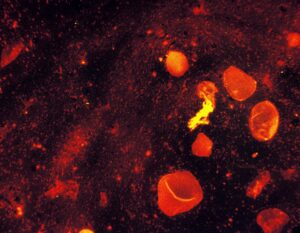When students moved in for the fall semester in August 2021, they took a single COVID-19 PCR test and received a cloth mask with a Georgetown ‘G’ on it. When many of those same students moved onto a decidedly quieter, and emptier campus on Jan. 11 for the spring semester, they took two tests—both PCR and rapid antigen—and some, though not all, received a higher grade N95 mask.
Students were informed of these changes, and received confirmation that spring classes would begin in a virtual format, through a series of emails, starting on Jan. 6, sent by Georgetown’s Chief Public Health Officer Dr. Ranit Mishori. As students move in between Jan. 11 and Jan. 31, when in-person classes are scheduled to begin, they expect to face a campus filled with new and unfamiliar protocols for preventing the spread of and treating COVID-19.
Mishori informed students that move-in windows based on available on-campus testing would be instituted, and required that students access Hoya Housing to notify them of a move-in window. The university also requested that students traveling from outside the D.C., Maryland, and Virginia area obtain a PCR test 24 to 48 hours before arrival. The request comes amidst a massive shortage in nation-wide testing, with a lack of at-home testing and a surge in Omicron cases resulting in extremely long queues at drive-through PCR test sites.
Upon arrival, students would be required to immediately perform two tests: an on-site PCR test, and a rapid antigen test kit. An extra rapid antigen test was also provided during check-in, for students to use at a later date. Students who have contracted the virus in the previous 90 days would be exempt from PCR testing, but would have to take an antigen test.
The highly transmissible nature of the Omicron variant meant students would need to prepare to confront a campus environment different from the one they left a month earlier. The school warned that, given soaring local positivity rates, students should prepare for the likelihood of needing to isolate two per room in the hotel on campus, or in their on-campus residence, which would entail housing COVID-negative and COVID-positive students in the same dorms, and even the same rooms.
“I would hope we could avoid that situation, and have people who are actively infected ideally not be with uninfected people,” Dr. Jesse L. Goodman, professor of medicine at Georgetown, said. “But if they have to be… then I think mask-wearing on the part of anybody is going to be important, maximizing ventilation.”
Goodman, who also directs the university’s Center on Medical Product Access, Safety and Stewardship (COMPASS) and is a co-chair of the Coronavirus Vaccine Analysis Team (COVAT), added that immunocompromised or otherwise high-risk students should not be isolated in this manner.
Goodman noted that Mishori’s advice of having over the counter medicines on hand in case a student has to self-isolate is useful, but that acetaminophen (Tylenol) may be more effective in treating symptoms than ibuprofen (Advil). For isolating students, he recommended watching out for worsening of symptoms after improvement—such as the return of a fever—or especially shortness of breath. While he acknowledged that the Omicron variant is not likely to be medically dangerous for the vast majority of undergraduates, both worsening of symptoms and shortness of breath could indicate a need for medical attention or antiviral treatments.
“I think where the mistake is made is where people sort of say, for 90 percent of people this is just a cold or something and I’m not worried about it,” he said. “When we had 700,000 people or more die, that’s obviously not true, you know. But on the other hand, it is true that for healthy young people generally, 99 percent are going to do okay with it.”
Mishori’s message confirmed that all campus programming would be virtual, and campus dining offered through grab-and-go format, through Jan. 30. A Jan. 14 email provided guidance that Yates gymnasium would be open in a limited capacity through this time frame as well, with limits on capacity and social distancing. GUSA passed a resolution requesting communication from the university on the effects of new policies on low-income students in particular, and held a conversation with the university on Jan. 6 to raise its concerns.
Students who resided in the hotel last semester face additional challenges. On Jan. 5, students on the fourth floor of the Georgetown Hotel received an email explaining they would be moved to another on-campus residence in order to prepare additional hotel rooms for isolation. The email requested that students either return to move their items between Jan. 6 to 8, or ask the university to move their items via a moving company. GUSA clarified that upon contacting Residential Living, students were given until the resumption of in-person classes after Jan. 30 to move their belongings, stressing the importance of leniency due to the circumstances of relocation.
University guidance also recommends using high-grade masks, and reiterated that masks are required for all students when indoors—whether masks were required, or even recommended outdoors was not addressed. Properly fitted N-95, KN-95, or KF-94 masks have been shown to be more effective than cloth or surgical masks, but fake masks have flooded the market in recent months. The CDC estimates that 60 percent of KN-95s in the United States are fake and don’t meet regulatory standards.
Goodman said multi-layer cloth and surgical masks are effective in preventing COVID transmission, but less so than quality high-grade masks. For students who choose to wear higher grade masks, Goodman emphasizes making sure the masks are real and come from a reliable supplier, not including Amazon. He also warns against trusting labels or promises from unfamiliar online vendors.
“Many of the fake ones actually say on the website ‘FDA approved’ or something like that, so they may actually put that out there in an effort to to look like they’re the real thing,” Goodman said.
According to a university spokesperson, free N95s should be available “at entrances to most campus buildings.” Upon returning to campus, however, not all students received one of these masks. Despite this, a university spokesperson warned against using single layer cloth masks.
“Community members should not wear a cloth mask or a mask with a vent or valve, because these masks do not sufficiently reduce the transmission of the virus from exhaled droplets and aerosol particles that might contain the virus,” a spokesperson wrote.
The university has agreed to student demands that the add/drop deadline for classes be pushed back until Jan. 31, and extend the deadline to request tuition refunds until Feb. 2, according to GUSA Vice President Thomas Leonard (COL ’22). GUSA also discussed the possibility of Yates, dining, and blanket tuition refunds due to the virtual setting, noting that the university was more willing to consider refunds for Yates and dining.
GUSA also questioned the university on its new isolation policies.
“[The] rationale there on the administrative front is the idea that Omicron largely is a rather mild disease,” Leonard said.
Goodman, however, warns that though Omicron may be less severe, there is still too little data for scientific consensus. “This wave is still peaking and severe illness and hospitalization usually occur 10 days or so after the onset of illness, so we can’t yet tell for sure, statistically, that this is less severe, but that’s the impression,” he said.
The high transmissibility also poses challenges. “The other big problem we’re having in the healthcare system is healthcare workers getting sick or infected and needing to be out of the workplace to avoid transmitting to patients. So it’s stressing the system, and for those reasons, I think a sort of a cautious approach like Georgetown’s taking is quite reasonable,” he added.
“In these deliberations with administration, we made sure that there were specific safeguards in place for immunocompromised students,” Leonard said. “With the isolation spaces that we do have, a number of those spaces will be reserved for students who are immunocompromised or in a situation in which being exposed to the virus is much more dangerous.”
In regards to the moving of hotel residents, GUSA clarified that upon contacting Residential Living, students were given until the resumption of in-person classes after Jan. 30 to move their belongings, stressing the importance of leniency due to the circumstances of relocation.
GUSA highlighted lagging booster upload records as a principal concern of the administration going into the spring semester. The university is currently receiving around a 20 percent booster upload rate, although GUSA surmised it could be due to a combination of students having already contracted Omicron, and therefore exempt from the booster, and simply forgetting to submit documentation. The deadline for uploading booster documentation is Jan. 21, and the university plans to continue offering booster shots at clinics on campus.
Penalties for not uploading booster documentation have yet to be formally decided.
“So far, we have heard from administration that there is going to be a hold on classes for the semester [should a student fail to submit booster documentation without an exemption], so you simply will not be able to participate or move in as you sort of previously detailed,” Leonard said.
“I would really want people to just remember to be safe and be compassionate,” Deborah Wey (SFS ’24), vice-chair of policy and advocacy for the GUSA Senate, said. “We are going into this city that we are not members of, going into this community.”







